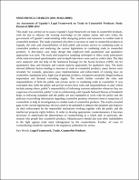| dc.description.abstract | SSEKUBUNGA CHARLES (2011-M162-20005)
An Assessment of Uganda’s Legal Framework on Trade in Counterfeit Products: Study Period of 2008-2013
This study was carried out to assess Uganda‟s legal framework on trade in counterfeit products, with the aim to enhance the existing knowledge on the subject matter and even widen the government of Uganda‟s understanding while designing polices and measures to combat trade in counterfeit products. The study examined why there is increase in trade in counterfeit products in Uganda, the roles and responsibilities of both public and private sectors in combating trade in counterfeit products and analysing the current legislations in combating trade in counterfeit products. A descriptive case study design that employed both quantitative and qualitative approaches was used. The study used purposive sampling techniques to select study participants while semi-structured questionnaires and in-depth interviews were used to collect data. The data were analysed with the help of the Statistical Package for the Social Sciences (SPSS 16) for quantitative data, and thematic and content analysis approaches for qualitative data. The study showed different factors leading to increase in trade in counterfeit products, many factors were revealed, for example, ignorance, poor implementation and enforcement of existing laws on counterfeit, inadequate laws, high cost of genuine products, corruption and greed, illegal products importation and demand exceeding supply. The results further revealed the roles and responsibilities of both the public and private sector in combating trade in counterfeit. It was concluded that, both the public and private sectors have roles and responsibilities to play which include among others, public‟s responsibility of informing customs authorities whenever they are suspicious of counterfeit, public‟s role in collaborating with Uganda National Bureau of Standards helps in enforcing standards and the public are also mandated to work with the police and the judiciary in providing information regarding counterfeit products whenever there is suspicions of counterfeits to help in investigations to combat trade in counterfeit products. The results revealed gaps in the current legislations; the laws need to be amended to enhance the penalties and improve on their enforcement by the responsible institutions working together with the public and the intellectual property rights holders. In order to develop appropriate countermeasures it becomes necessary to understand the phenomenon of counterfeiting as a whole and, in particular, the reasons why people buy counterfeit products. Manufacturers should also join other stakeholders in the fight against trade mark infringement by the counterfeiters. Further, all cases of counterfeiting should be reported to the regulatory authorities for action.
Key Words: Legal Framework, Trade, Counterfeit Products. | en_US |


